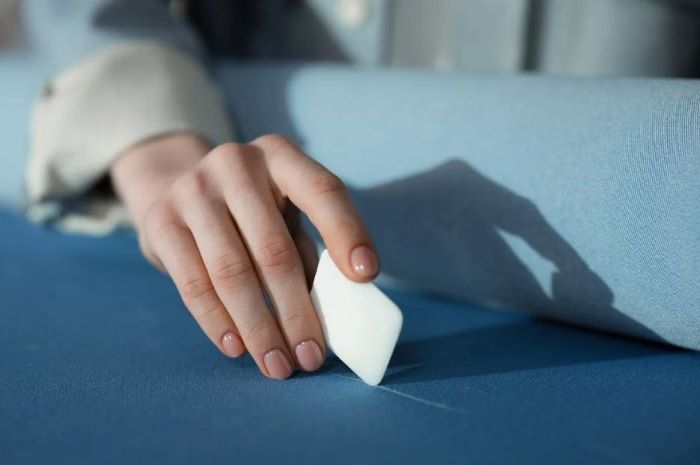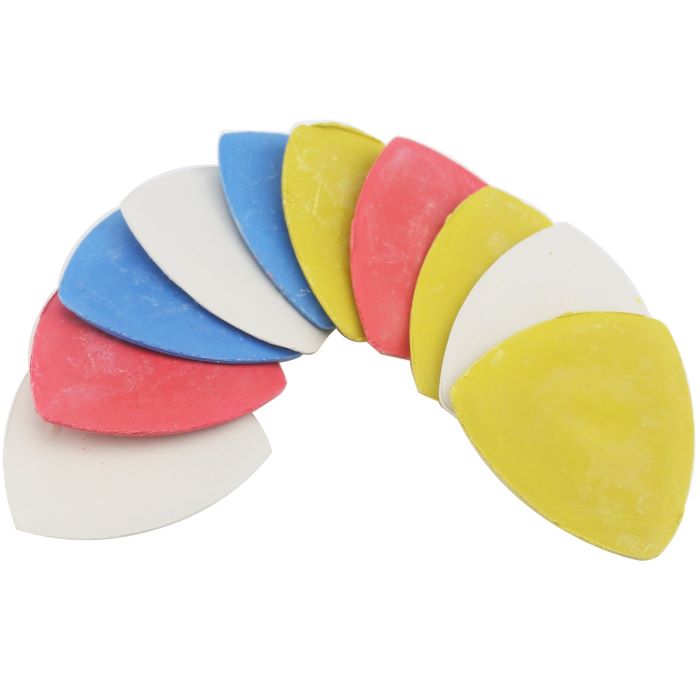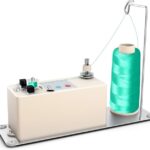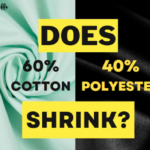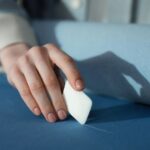Tailor’s chalk is a handy tool used by tailors to mark fabric during the process of garment construction, sewing, quilting, or embellishment. However, once the stitching is complete, removing the marks left by the tailors chalk can sometimes be a challenging task.
In this article, I am going to answer how to remove tailors chalk from fabric, ensuring your finished garment looks pristine. Let’s dive in.
Does chalk stain clothes?
The answer is yes. Sometimes it becomes challenging to remove chalk from fabric. In this article, I will explain all possible and easy methods for how to remove tailors chalk.
When working on sewing projects, tailor’s chalk is a common tool used to temporarily mark the fabric. It allows tailors and sewers to create guidelines for accurate stitching and pattern alterations. However, these chalk marks need to be removed to ensure the garment’s final appearance is clean and professional.
Tailor’s chalk is a special type of chalk specifically designed for use in sewing and tailoring. Tailor’s chalk is a specialized marking tool made from a combination of powdered chalk and pigment.
It comes in various colors, including white, yellow, blue, pink, etc. The different colors help the tailor’s marks stand out on different fabric shades. These chalks are specifically formulated to leave temporary marks on fabric. You can easily remove chalk from the fabric.
How to remove blue tailors chalk from fabric?
Yes, you can remove blue tailors chalk from the fabric. It largely depends upon the type of stuff your use. The color does not matter a lot.
Tailor’s chalk is available in two main forms, Pencil-shaped chalk, and square-shaped chalk. Both types serve the same purpose but offer different levels of precision.
After reading this article you will get answers to all the questions in your mind related to this topic.
There are three main types of tailor’s chalk.
- Clay-based chalk
- Wax-based chalk or wax tailor chalk
- Mixture of both
Tailor’s chalk is used to make temporary marks on your project for various purposes such as indicating sewing lines, cutting lines, darts, pleats, buttonholes, and other design details.
When making alterations or adjustments to a garment pattern, the tailor’s chalk is used to mark the areas where changes need to be made. This allows the tailor to visualize and modify the pattern according to the desired fit or design.
Tailor’s chalk is also used to mark fabric during the cutting process. It helps indicate where the fabric should be placed, ensuring proper alignment and grain direction. If you are using tailors chalk then you must know how to remove tailors chalk after the project is complete.
Tailor’s chalk is found in different shapes but the two most commonly used shapes are pencil-shaped chalk and Square or rectangle-shaped chalk.
Pencil-shaped chalk resembles a pencil and is sharpened to a fine point. It provides precise markings, making it ideal for detailed work or marking small pattern notches.
Square-shaped chalk, also known as tailor’s crayon, has a broader tip, allowing for wider lines and faster marking. It is suitable for larger pattern markings and general garment construction.
While tailor’s chalk is an essential tool during garment construction, it’s important to remove the markings once they have served their purpose. Removing tailor’s chalk marks is crucial to achieving a professional and clean finish for your sewing projects.
Failing to remove the tailor’s chalk can lead to unsightly stains or discoloration. To make your finished garment appear unprofessional you must know how to remove tailors chalk.
If the garment is exposed to moisture or heat, the chalk marks may become more visible or even set permanently, which can be challenging to remove later on.
Sometimes the water is unable to take off the fabric chalk from some fabrics such as pure crepe and duster silk. It is important to take off the chalk marks from these fabrics. If not removed it can also leave permanent stains.
Before you begin removing tailor’s chalk marks, it is important to consider a few precautions to protect your fabric. Before using any method to remove the chalk check the fabric care instruction, test on a small, inconspicuous area, and avoid excessive rubbing.
Different fabrics require different cleaning methods. Always refer to the care label on your fabric to determine the most suitable method for removal.
Before applying any cleaning method, test it on a small and hidden part of the project to ensure it doesn’t cause any damage or discoloration.
While removing the chalk marks, avoid excessive rubbing as it can damage delicate fabrics or spread the chalk residue further.
Tailors chalk must not be waxy which will make your hands sticky. It must be dry and not waxy. For fine and precise lines the edge of the chalk must be sharp. Don’t press the chalk too hard.
How to remove tailors chalk from clothes?
There are several effective methods to remove tailor’s chalk marks from fabric. Mostly it is easy to remove the tailor’s chalk with a rubbing action.
If the chalk is stuck to the fabric, you can try using a hairdryer on high to heat up the area and then use a scrubbing brush to brush the chalk off. Let’s explore some other methods step by step.
One of the simplest ways to take off the tailor’s chalk marks is by using a toothbrush. Don’t forget to use a soft brush rather than a hard brush which will damage the fabric. Follow these steps you will be able to know how to remove tailors chalk from your favorite fabric.
- Gently brush the marked area with a toothbrush to loosen and take off the chalk particles. This brush will help you to get rid of the chalk traces without ruining your project.
- Continue brushing until all visible marks have been removed.
- If any residue remains, you can use a sponge dampened with water but it could leave water stains on some kinds of fabrics such as pure crepe and duster silk.
If it still doesn’t work then you can use nail polish remover to take off the marks. Dip the brush in the nail point remover liquid and brush gently on the area of the mark.
How to remove tailors chalk from cotton?
By using this method you can remove traces of chalk from the cotton. Cotton is not a delicate fabric as compared to other delicate fabrics. So it is easy to remove chalk stains from cotton.
Don’t use a hard brush, it can damage your delicate clothing. Be gentle while rubbing. Read the care label on the fabric before using this method.
If the fabric allows, you can use a damp cloth to take off the chalk marks. This method doesn’t work for all types of fabrics. Here’s what you need to do. If you are curious to know how to remove tailors chalk then read the steps below.
- Dampen a clean, white cloth with lukewarm water.
- Gently blot the marked area with the damp cloth, avoiding excessive rubbing.
- Repeat the process until the chalk marks fade away.
- Allow the material to air dry completely.
Don’t use a wet cloth, use a damp cloth. White cloth or cloth having fast color is the better choice. A colored cloth can leave its color on your project.
It is one of the best short and smart tips to remove chalk from fabric. Using a wet wipe to remove the chalk from your clothes is very easy. You don’t need any proper guidelines to apply this method.
Take a wet wipe and rub it over the chalk mark. Don’t apply too much pressure. Gently rub the wet wipe over the mark until the stain is removed.
Don’t rub hard on the fabric. Don’t apply too much pressure.
Vinegar is a natural cleaning agent that can help to get rid of tailors chalk tracing. A diluted solution will not help to remove some stubborn chalk stains. White vinegar is the best choice for stain removal.
Do vinegar solution damage fabric? Usually, it is safe to use vinegar to wash your clothes. It is the best idea to have a spot test on the fabric. The acid in the vinegar will damage the fabric if it is not diluted properly. It is best to test a small area of fabric first to make sure the solution is not too strong.
Follow these steps take off tailors chalk using vinegar and water.
- Mix equal parts of white vinegar and water to create a vinegar solution.
- Dampen a clean cloth with the vinegar solution. Try to use colorless white cloth for this method.
- Gently blot the chalk marks with the damp cloth, ensuring not to saturate the fabric.
- Repeat the process until the marks disappear.
- Rinse the fabric with clean water to remove any residual vinegar smell.
- Air dry the fabric completely.
Wash your fabric with a mixture of 2 parts of vinegar and 5 parts of water (2:5).
Using an Eraser to Remove Tailor’s Chalk
An eraser can be an effective tool for you to remove tailors chalk marks from fabric. You must read the guideline on the pack of erasers. Here’s how to use it.
- Choose a soft white eraser.
- Gently rub the eraser over the chalk marks, using light pressure.
- Continue erasing until the marks fade away.
- Brush away any eraser debris or residue from the fabric.
Make sure that you don’t stretch or rub the fabric too much otherwise your fabric will be damaged irreversibly. Fabric erasers are usually made for light pencil marks but usually it works for all types of marks.
You can use a magic eraser to remove the tailor marks from your project. This is a very effective method but could damage the sewing project. Try on a hidden part of the fabric before using magic eraser.
Magic eraser is easily available in the market. You can also order it online on Amazon.
This is another effective way to remove the stubborn tailors chalk marks from your sewing project. Precaution is compulsory for all methods. Use the stain remover to an invisible area of the project before applying it to the targeted area.
Our recommended stain remover is Shout Stain Remover which is an effective solution.
Rub off the excess chalk from the fabric using a toothbrush. Read the instruction on the cleaner to ensure that it is safe for your fabric. Dilute the carpet cleaner by adding water by the recommended ratio if necessary.
Apply a small amount of diluted solution of carpet cleaner on the targeted area. Use white cloth or sponge to apply the cleaner to the targeted area of the project. Use a damped cloth or sponge don’t soak it.Gently blot the chalk stain on the fabric with a damp cloth or sponge. Once the stain is removed rise the fabric with water. Allow the fabric to dry completely. Check if the stain is completely removed. Repeat the process if needed.
This method is not applicable to all types of fabrics. If your fabric is delicate then you must use other methods or consult your tailor.

